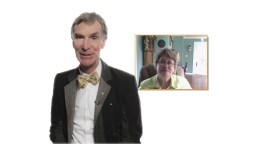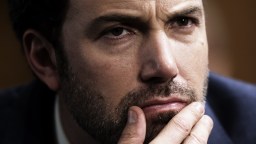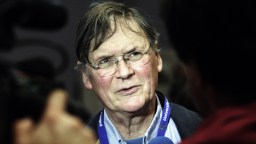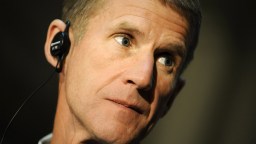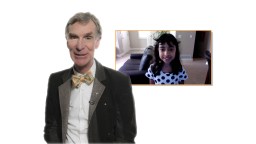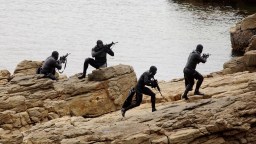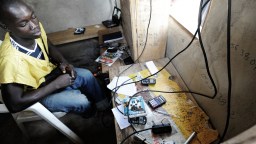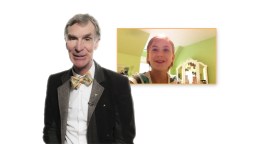All Videos
All Stories
So let’s talk about fracking. It isn’t a terrible idea in theory, says Bill Nye the Science Guy, but it can’t be allowed to go unregulated. This is because new technologies have promoted irresponsible fracturing practices with severe environmental and public health consequences.
▸
11 min
—
with
“Islamic extremism is an assault on the ideas of liberalism, on the idea of innovation, on women, on gays, on tolerance, on civilization,” says the author and social activist. She says if American cultural leaders like Ben Affleck can’t see this, it’s because they’re not paying attention.
▸
3 min
—
with
“In my opinion you’re allowed to cry.” Neuroscientist Dr. Wendy Suzuki reacts to the controversial comments made this week by Nobel Laureate Sir Tim Hunt.
▸
3 min
—
with
According to retired U.S. Army General Stanley McChrystal, top-notch cybersecurity isn’t modeled after the Maginot Line or a giant wall attempting to block outside forces from getting in. Instead, we need to design cybersecurity that acts like an immune system, learning on the go every time a new or unique challenge emerges.
▸
4 min
—
with
National cuisines tend to be defined by historical precedent influenced by agricultural limitations. As the United States is a young country with rich soil, its own quintessential cuisine never developed.
▸
3 min
—
with
In this Big Think+ preview clip, author and economist Sylvia Ann Hewlett explains that the distance between merit and success is bridged by subtle, leaderly signals communicated through your actions.
▸
2 min
—
with
Exciting new technologies with major health care implications are emerging. Singularity University’s Daniel Kraft demonstrates some of these new innovations and explains how exponential technology will democratize health care for consumers.
▸
4 min
—
with
“Education is far less about a set of facts than a way of thinking,” says professor and theoretical physicist Lawrence Krauss. “And therefore what I always think should be the basis of education is not answers, but questions.”
▸
3 min
—
with
In today’s edition of #TuesdaysWithBill, 8-year-old Shya asks Bill Nye about the LightSail satellite, a solar sailing spacecraft launched by the Planetary Society and currently “sailing” around us in space.
▸
3 min
—
with
Whether you’re a part of a Navy SEALs team or just a paper pusher with a white collar job, the principles of effective leadership and organizational culture remain constant. Every team needs a leader who can instill inspiration, direction, guidance, and hope. These are the building blocks of success.
▸
3 min
—
with
Philosopher and social critic Slavoj Žižek dislikes the sense of self-commodification and self-manipulation innate in online dating.
▸
10 min
—
with
James Manyika, director at the McKinsey Global Institute, explains that technology isn’t just for rich countries anymore.
▸
5 min
—
with
Where the 20th century was an era dominated by organizational hierarchies, the 21st century is all about networks.
▸
3 min
—
with
Organization expert Carson Tate suggests taking a good hard look at all the things you assume you “should” do and question why they’re so important. By seeing beyond the veneer of our “shoulds” we can better understand when it’s best to say “yes” and when it benefits us to say “no.”
▸
3 min
—
with
When it comes to issues such as climate change, government agencies like the EPA are charged with setting a stage for solutions rather than taking action themselves.
▸
3 min
—
with
In our very first edition of “Tuesdays with Bill,” Bill (with an assist from Kiera) goes back to the beginning and tells the story of how “Bill Nye the Science Guy” came to be.
▸
3 min
—
with
Earlier this year, equality activist Ash Beckham spoke to Big Think about Bruce (now Caitlyn) Jenner and why having a high-profile transgender person share their story is an important milestone for the LGBTQ movement.
▸
2 min
—
with
Could a student get the same liberal arts experience out of an online education than they would on a physical campus? Probably not, says Fareed Zakaria, but that doesn’t mean online learning isn’t without its many benefits.
▸
2 min
—
with
Tavis Smiley dictates a letter to a young American with inspiration from his late friend, Maya Angelou. No matter how much you seek the answers to life from external sources, the truth you seek can only be found within you.
▸
3 min
—
with
The downside of technological progress is that we’ve created more and more technologies capable of killing us. In order to adapt, behavioral psychologist Dan Ariely explains we have to get better at avoiding irrational decisions.
▸
3 min
—
with
Psychologist Heidi Grant Halvorson delves into the brain to identify how prejudices and stereotypes are developed.
▸
4 min
—
with
Is the time we experience in our day-to-day lives real? Theoretical physicist Brian Greene explores the potential particles of time and why we could, in theory, travel forward in time but not back.
▸
5 min
—
with
Want to build a stronger brand? The first thing you need to do is win over your customers. Embrace consumer empathy now and be rewarded later.
▸
3 min
—
with
“The United States does not know what it stands for,” explains political scientist Ian Bremmer, author of a new book about the American imperative to define foreign policy values.
▸
5 min
—
with
No, Stephen J. Dubner doesn’t actually endorse bank robbery. What he does endorse is amusing deconstructions of cultural acts or items — robbing banks, for instance — and analyzing data to stumble upon intriguing observations.
▸
4 min
—
with
When we think about ISIS it’s important to try to understand what they are and why they’re as effective as they are.
▸
4 min
—
with
Thupten Jinpa explains how recent advances in neuroscience have allowed for a better understanding of the science of compassion.
▸
3 min
—
with
Hollywood producer Brian Grazer’s grandmother changed his life when she told him curiosity would be his greatest attribute as long as he maintained the courage to use it.
▸
3 min
—
with
Blue zones are regions on Earth where the local human population enjoys exceptionally long average life spans. Author and explorer Dan Buettner has studied these populations and the dietary and lifestyle elements they have in common.
▸
4 min
—
with
What is mindset science? Think of it this way: The way that you think about something can actually transform the effect that it has on you.
▸
2 min
—
with
